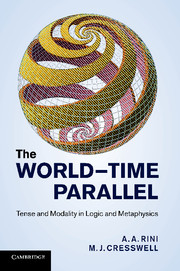Book contents
- Frontmatter
- Contents
- Preface
- Introduction
- PART I TRUTH AND INDEXICALITY
- PART II PREDICATE LOGIC: TENSE AND MODAL
- PART III TIMES AND WORLDS, OR TENSE AND MODALITY?
- 9 Primitive modality and primitive tense
- 10 ‘Modalism’ and ‘tensism’
- 11 The present and the actual
- 12 Utterances
- 13 Relativity
- PART IV DE RERUM NATURA
- Appendices
- Bibliography
- Index
10 - ‘Modalism’ and ‘tensism’
from PART III - TIMES AND WORLDS, OR TENSE AND MODALITY?
Published online by Cambridge University Press: 05 March 2012
- Frontmatter
- Contents
- Preface
- Introduction
- PART I TRUTH AND INDEXICALITY
- PART II PREDICATE LOGIC: TENSE AND MODAL
- PART III TIMES AND WORLDS, OR TENSE AND MODALITY?
- 9 Primitive modality and primitive tense
- 10 ‘Modalism’ and ‘tensism’
- 11 The present and the actual
- 12 Utterances
- 13 Relativity
- PART IV DE RERUM NATURA
- Appendices
- Bibliography
- Index
Summary
In this chapter we shall examine further the suggestion made in the last chapter, according to which worlds and times are identified as the quantificational ranges of the modal and tense operators. In particular we shall look at the work of Graeme Forbes, since he is an author who is very well aware of the formal results which have played such a large part in our own book. Because Forbes's response to the formal results has been quite different from ours, a discussion of his position enables many of the issues at stake to be helpfully addressed. As noted in footnote 6 on p. 105, above, the view that modality is more basic than possible worlds is what Forbes 1989, p. 36, calls ‘modalism’, and in this chapter we shall look at what Forbes has to say about modalism, and will look at the temporal parallel. Although both Forbes 1985 and 1989 are about modality, and barely mention the temporal analogy (with the exception mentioned on p. 16, above), yet they provide a good source for examining parallel temporal arguments. It's hard to get a word which corresponds to Forbes's ‘modalism’. The temporal equivalent of the view in question is Prior's view that tense is more basic than temporal moments and that if we talk at all about moments we should make them up out of tense in much the way Forbes considers we should make up talk about worlds out of modal talk.
- Type
- Chapter
- Information
- The World-Time ParallelTense and Modality in Logic and Metaphysics, pp. 112 - 120Publisher: Cambridge University PressPrint publication year: 2012

